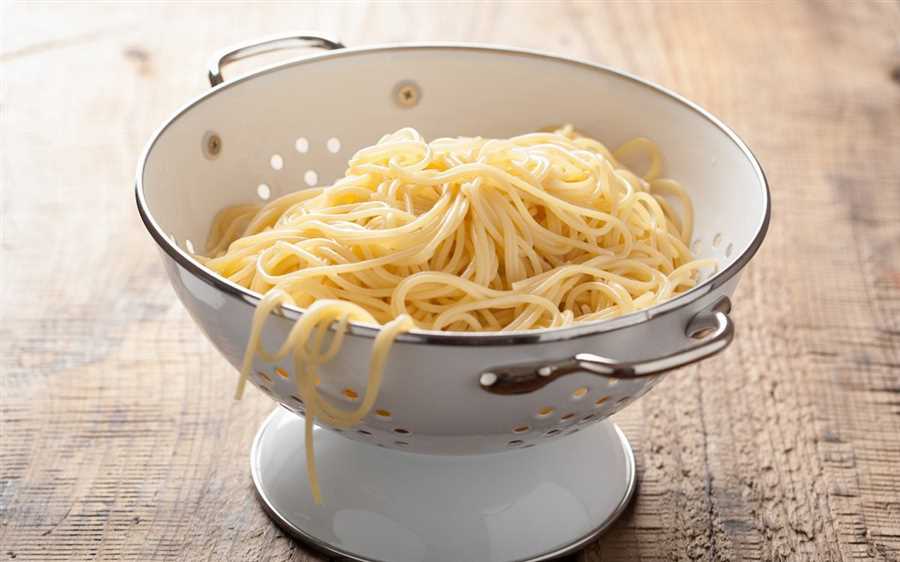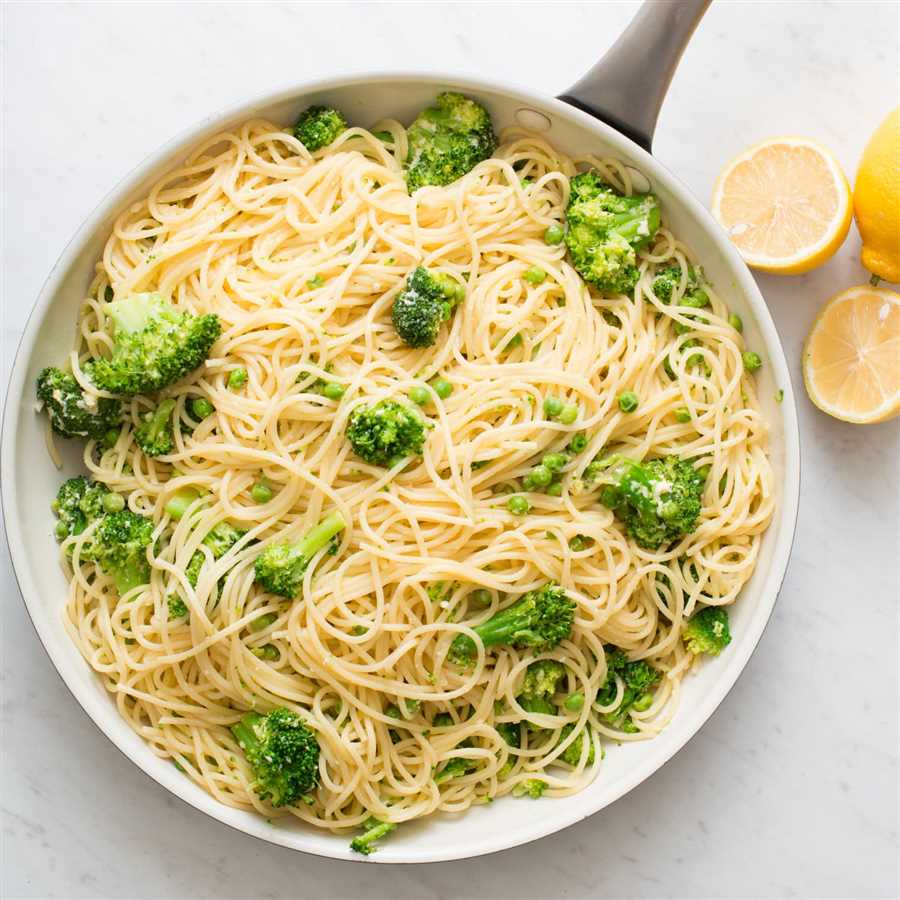







Many people wonder whether it is possible to freeze cooked noodles. The answer is yes, you can freeze cooked noodles. Freezing cooked noodles is a convenient way to save time and effort in the kitchen. Whether you have leftover noodles from a meal or you want to prepare a large batch of noodles in advance, freezing them is a great option.
Freezing cooked noodles can be beneficial, especially if you lead a busy lifestyle. It allows you to have a ready-to-eat meal on hand whenever you need it. Cooked noodles can be frozen for up to three months, but it is important to follow the proper freezing and thawing techniques to maintain their texture and taste.
When freezing cooked noodles, it is essential to cool them completely before placing them in the freezer. This helps to prevent the formation of ice crystals, which can alter the texture of the noodles. It is best to freeze the noodles in a single layer on a baking sheet before transferring them to an airtight container or freezer bag. This allows them to freeze quickly and evenly.
When it comes to thawing frozen cooked noodles, it is recommended to transfer them to the refrigerator and let them thaw overnight. This slow thawing process helps to preserve the texture and taste of the noodles. Once thawed, you can reheat the noodles by boiling them for a few minutes or by microwaving them with a little bit of water or sauce.
Why Freeze Cooked Noodles?

Freezing cooked noodles is a convenient way to ensure that you always have a quick and easy meal option available. Whether you want to save leftovers or prepare meals in advance, freezing cooked noodles can help you save time and reduce food waste.
Here are a few reasons why you might choose to freeze cooked noodles:
- Meal preparation: Freezing cooked noodles allows you to prepare meals in advance and have them readily available. You can cook a large batch of noodles and freeze them in individual portions, making it easy to defrost and add to your favorite recipes.
- Leftover preservation: If you have leftover cooked noodles, freezing them is a great way to prevent them from going to waste. By freezing them, you can extend their shelf life and enjoy them at a later time.
- Convenience: Having frozen cooked noodles on hand can be a time-saver. Whether you need a quick lunch or a simple dinner, you can easily defrost the noodles and toss them with your favorite sauce or toppings.
When freezing cooked noodles, it’s important to properly package them to maintain their quality. Use airtight containers or freezer bags to prevent freezer burn and maintain the texture of the noodles.
Overall, freezing cooked noodles is a practical solution for busy individuals or anyone looking to simplify meal preparation and reduce food waste.
Advantages of Freezing Cooked Noodles
Freezing cooked noodles is a convenient and practical way to extend their shelf life and have a quick meal on hand. Here are some advantages of freezing cooked noodles:
- Time-saving: By freezing cooked noodles, you can save time in the kitchen. Instead of cooking noodles from scratch every time you want to enjoy them, you can simply defrost and reheat the frozen ones.
- Meal planning: Freezing cooked noodles allows you to prepare meals in advance and plan your menu. You can cook a larger batch of noodles, freeze them in portions, and have them ready to use for various dishes like stir-fries or pasta salads.
- Reduces waste: Freezing cooked noodles helps to reduce food waste. If you have leftover cooked noodles that you can’t finish, instead of throwing them away, you can freeze them and use them later.
- Cost-effective: Buying noodles in bulk and cooking them in larger quantities can save you money. Freezing the cooked noodles ensures that they stay fresh and can be used for future meals, preventing the need to buy more noodles.
- Variety of recipes: With frozen cooked noodles, you have a variety of recipes at your fingertips. You can use them as a base for different pasta dishes, soups, or even as a side dish for various main courses.
Overall, freezing cooked noodles offers convenience, flexibility, and efficiency in the kitchen. It’s a great way to make the most of your noodles and have tasty meals ready whenever you need them.
How to Freeze Cooked Noodles
Step 1: Allow the cooked noodles to cool completely.
Step 2: Portion the noodles into individual servings or store them in airtight containers.
Step 3: Label the containers with the date and contents to keep track of freshness.
Step 4: Place the containers in the freezer, ensuring they are stored in a flat position.
Step 5: Frozen cooked noodles can be stored for up to 2 months.
Step 6: When ready to use, thaw the noodles in the refrigerator overnight.
Step 7: Reheat the thawed noodles by microwaving or heating on the stovetop until warmed through.
Note: Freezing may alter the texture of the noodles slightly, but they will still be safe to eat.
Thawing and Reheating Frozen Cooked Noodles
When it comes to thawing and reheating frozen cooked noodles, there are a few important steps to follow to ensure that the noodles are safe to eat and maintain their taste and texture. Here is a simple guide:
1. Thawing the noodles: To thaw frozen cooked noodles, it is best to transfer them from the freezer to the refrigerator. Allow them to thaw overnight or for several hours until they are completely defrosted. Avoid thawing them at room temperature, as this can lead to bacteria growth.
2. Reheating the noodles: Once the cooked noodles are thawed, you can reheat them using several methods. One easy way is to simply place them in a microwave-safe dish and microwave them on high for 1-2 minutes, or until they are heated through. You can also reheat them on the stovetop by placing them in a saucepan with some water or sauce, and heating them over medium heat until they are warmed up.
3. Adding sauce or toppings: If desired, you can add your favorite sauce or toppings to the reheated noodles to enhance their flavor. Be sure to use fresh ingredients and avoid using any sauces or toppings that have been previously frozen.
Note: It is important to remember that reheating noodles too many times can affect their taste and texture. It is recommended to only freeze and reheat noodles once for best results.
With these simple steps, you can enjoy your frozen cooked noodles without compromising on taste or safety. Just make sure to follow the thawing and reheating guidelines for best results!
Storage Tips for Frozen Cooked Noodles

Freezing cooked noodles can be a convenient way to save time in the kitchen. Whether you have leftover pasta from a meal or want to prepare noodles in advance, freezing them can help extend their shelf life and preserve their taste and texture. To ensure the best results when freezing cooked noodles, follow these storage tips:
1. Cool and Drain Noodles
Before freezing your cooked noodles, allow them to cool completely. This helps prevent condensation and ice crystals from forming, which can affect the texture of the noodles once they are thawed. Additionally, make sure to drain the noodles well to remove any excess moisture.
2. Portion the Noodles
When freezing cooked noodles, it is best to portion them into individual servings. This allows for easier meal planning and prevents the need to thaw and refreeze the entire batch of noodles. Use freezer-safe containers or bags to divide the noodles into portions.
For longer storage, consider investing in a vacuum sealer to remove any air from the packaging. This can help prevent freezer burn and maintain the quality of the noodles.
Remember to label the containers or bags with the date of freezing to keep track of their freshness.
When you’re ready to use the frozen cooked noodles, simply remove the desired portion from the freezer and thaw them in the refrigerator overnight. Alternatively, you can thaw them in the microwave or by placing the sealed bag or container in a bowl of cold water.
Once thawed, cook the noodles as desired. You can add them to soups, stir-fries, or pasta dishes, or even enjoy them cold in salads.
By following these storage tips, you can enjoy the convenience of having cooked noodles readily available in your freezer while ensuring their taste and texture are well-preserved.
Q&A
Can cooked noodles be frozen?
Yes, cooked noodles can be frozen. It is recommended to cool them first and then store them in an airtight container or freezer bag.
What is the best way to freeze cooked noodles?
The best way to freeze cooked noodles is to let them cool completely, then transfer them to an airtight container or freezer bag. Be sure to remove as much air as possible to prevent freezer burn.
How long can cooked noodles be frozen?
Cooked noodles can be frozen for up to 2 months. It is recommended to label the container with the date they were frozen so you can keep track of how long they have been stored.
Can I freeze homemade noodles?
Yes, homemade noodles can be frozen. It is best to freeze them before cooking, as they may become too soft or mushy if frozen after cooking.
Can frozen noodles be reheated?
Yes, frozen noodles can be reheated. The best way to reheat frozen cooked noodles is to thaw them in the refrigerator overnight, then heat them briefly in a saucepan or microwave until warmed through.
Can I freeze cooked noodles?
Yes, you can freeze cooked noodles. Allow them to cool completely before packaging them in airtight containers or freezer bags to prevent freezer burn.







